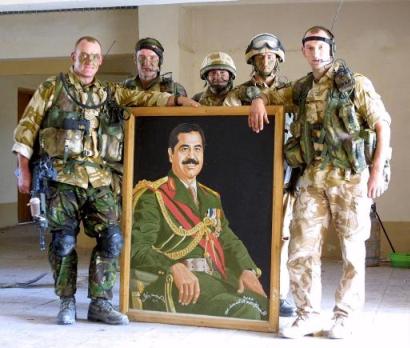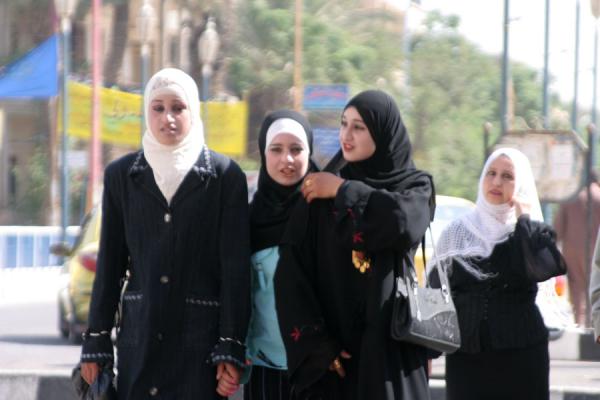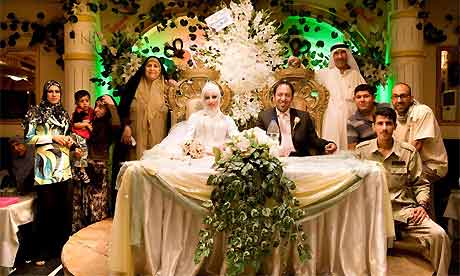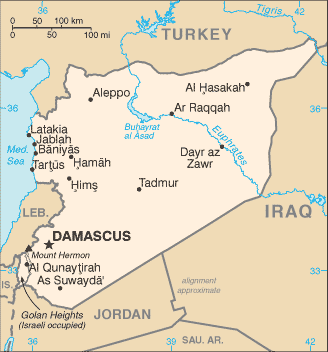Syria as you can see and hear now from the news is not having a stable government nor happy Syrians. This all start and is based on Syria's history and here you will learn major historic dates that have changed how life is today and how people view everything from Syria.
Syria's Background:
- Archaelogists demonstrated that Syria was the center of Ancients Civilizations on Earth
- Elba was discovered in 1975
- was a great Semetic Empire spread from Red Sea to Turkey from 2500-2400 B.C
(Elba)
- Damascus
- Settle in 2500 B.C
- Oldest inhabitated city
- Muslim rule in A.D 636
-Became capital of Omayyad Empire
(Damascus)
French Occupation:
- In 1920, Arab Kingdom of Syria established under king Faysal of the Heshemite family
- He ruled over Syria last a couple of months because of Syrian Arab forces with French forces
- Then French troops took over
- Fall of French was on 1940
- Syria came under control of Vichy Government until British and Free french occupied the country July 1941.
- Syrian Nationalist forced French troops to evacuate in April 1946
- Left government under republic government
- Formed during mandate
Independence to 1970:
- Syria got their independece on April 17, 1946
- But series of military begun 1949 and civil ruler, army colonel Adib Shishakli got power on 1951
- Then continued political movement supported by competing factions in military eventhough brought Arab Nationalist and Socialist to power
- Made union with Egypt
- On Feb. 1, 1958 Syria and Egypt merged to create the United Arab Republic, and all Syrian political parties ceased over activities
- Syria suceded going back to Syrian Arab Republic
- Ba'ath took over Syria
- Syria looked for an agreeement and was succesful which happended inCairo on April 17, 1963
-But problems arose and Ba'ath regime began to work for bilate
- November 1963- Ba'ath regime was over thrown
- May 1964- President Amin Hafiz of NCRC promulgated a provisional constitution providing for a National Council of Revolution (NCR)
- An apointed legislature composed of represerntatives of mass organiztion
- on Feb. 23, 1966- grouped of army officers carried out a succesful, intra-party coup, imprisoned Pres. Hafiz, dissolved the cabinet and the NCR, abrogated the provisional constitutionand described a rectification of Ba'ath Party principal
- The defeat of the Syrians and Egypt in June 1967 war with Isreal weakened the radical socialist regime
- In 1970 retreat of Syrian forces sent to aid the PLO during "Black September" hostillities with Jordan reflect this political disagreement within the ruler Ba'ath headership
- November 13, 1970- Minister of defense Hufiz al- Asad affected a bloodless military coups and assumed the role of prime minister
(Ba'ath, in the Picture Frame)
(Hafiz al- Asad)
(Amin al- Hafiz)
1970-2000:
- Prime Minister Hufiz al- Asad created an organizational government and to consolidate control
- March 1971-the party held its regional congress and elcted a new 21-member Regional command headed by Asad
- March 1972- broaden the base of his government and Hafiz al-Asad formed the National Progressive Front
- Collition of parties led by Ba'ath Party and elections were held to established local councils in each of Syria's governmorates
- March 1973- A new Syrian Constitution went into effect followed shortly thereafter by parliamentary elections for the people council, which was the first election like this since 1962
- From 1976 until its suppression in 1982 the anchorservsative Muslim Brotherhood led an armed in surgency against the regime
- Feb. 1982- gave a responce and the government crushed the fundamentalist opposition centered in the city of Hama and caused many deaths
- Since anti-regime was limited
- Since 1990 participation in the U.S led Syria relation with Arab states and west and faced negotiations with Isreal and failed
- Oct. 1991- Syria participated in the Middle East peace conference in Madrid
- June 10, 2000- Hafiz al-Asad died after 30 yrs. in power
- After the constitution minimized the age for Presidents from 40-43
- on July 10, 2000- Bashar al- Asad was elected President (was Hafiz al- Asad)
(Bashar al- Asad)
2000-2011:
- Sept. 11, 2001 Syrian Gvernment limited contact with U.S
- Dec. 2003- Pres. George W. Bush signed into law the Syria Accountability and Lebanese Sovereignty Restoration Act of 2003
- In May 2004- the President determined that Syria had not met these conditions and implemented sanctions that prohibit the export to Syria of U.S
- Tensions between Syria and the United States intensified from mid-2004 to early 2009, primarily over issues relating to Iraq and Lebanon
- On May 27, 2007- President Al-Asad was reelected
- During 2008, though Syria’s relations with the U.S. remained the same
- On March 2011 the border had yet to be demarcated
Syria's Principal Government Officers are:
President- Bashar Al-Asad
Vice President- Farouk Al-Shar'a
Vice President- Najah al-Asad
Prime Minister- Muhammad Naji al-Otari
Minister Of Foreign Affairs- Walid al-Mouallem
Ambassador of US- Imad Maustapha
Ambassador of United Nations- Bashar al-Ja'fari













